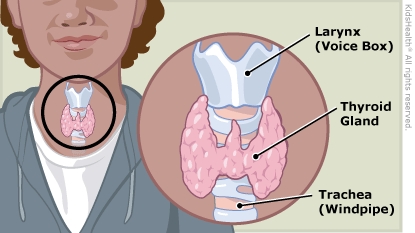Congenital Hypothyroidism
What Is the Thyroid?
The thyroid is a small gland below the skin and muscles at the front of the neck, at the spot where a bow tie would rest.
It is soft, brownish red, and weighs less than an ounce. Its two halves (lobes) look like a butterfly’s wings and each lobe is about the size of the end of the thumb. The thyroid is small, but it is powerful and helps the body do many important things like grow, make heat, and to develop normally.
What Is Hypothyroidism?
Hypothyroidism (or underactive thyroid) is when the thyroid gland doesn't make enough thyroid hormone. Low thyroid hormones make the body use up energy more slowly, and chemical activity (metabolism) in the cells slows down.
Hypothyroidism is a common condition, especially in adult women.

What Is Congenital Hypothyroidism?
Kids can have hypothyroidism too. When a baby is born with it, it's called congenital hypothyroidism.
Other kids develop it later, usually late in childhood or as teens. Most of these cases are caused by the disease Hashimoto's thyroiditis.
What Are the Signs & Symptoms of Congenital Hypothyroidism?
Early signs of congenital hypothyroidism in a baby include:
- jaundice (yellow skin or eyes)
- sleeping longer or more often than usual
- constipation
- a large soft spot (fontanel) on the head
- large, swollen tongue
- weak ("floppy") muscle tone
- swelling around the eyes
- poor or slow growth
- cool, pale skin
- large belly with the navel sticking out
Without treatment, children with congenital hypothyroidism can develop permanent mental disabilities. They also may have a poor appetite and breathing problems.
What Causes Congenital Hypothyroidism?
Most cases of congenital hypothyroidism happen because the thyroid doesn't form correctly in the baby during pregnancy. At birth, the baby may have no thyroid gland at all, or have a small, partially developed gland. Why this happens is often unknown, but in some cases it is genetic.
Less commonly, a baby's thyroid did fully develop, but can't make normal amounts of thyroid hormone. This is usually due to a genetic problem. Other children born to the same parents have a 1 in 4 chance of having the same thyroid problem.
How Is Congenital Hypothyroidism Diagnosed?
It's very important to diagnose and treat hypothyroidism right away. So thyroid testing is done on all infants at birth as part of normal newborn screening.
A heel prick blood sample is tested to look for:
- low levels of T4 (thyroxine), a hormone made by the thyroid that helps control metabolism and growth
- high levels of TSH (thyroid stimulating hormone), made by the to stimulate the thyroid and increase its production of thyroid hormones
If the newborn screen test is abnormal, other blood test are done to be sure of the diagnosis. Sometimes doctors order imaging tests, such as an ultrasound or a thyroid scan, to get more information.
How Is Congenital Hypothyroidism Treated?
A child with hypothyroidism will take thyroid hormone to make up for what the thyroid gland can't make. Most kids need to take the medicine for the rest of their lives.
Some infants are born with temporary hypothyroidism. This can be caused by things such as premature birth, thyroid disease in the mother, or medicines the mother had during pregnancy. This form of hypothyroidism usually goes away by itself in the first weeks or months of life.
How Can I Help My Child?
If your child has hypothyroidism, it's very important to give the thyroid hormone as instructed by your doctor.
If your child is too young to chew or swallow the pill, crush it and mix it with a small amount of water, non-soy baby formula, or breast milk. It is easiest to mix the medicine in a small amount of liquid and give it to your child at the start of a feeding so that they drink it all. Some thyroid hormone pills dissolve more easily in liquids than others, so talk to your doctor if you have trouble with this. It's very important for your child to get the whole dose of medicine.
Some infant formulas (especially soy formulas), medicines, and mineral supplements (like calcium and iron) may block the thyroid medicine from being absorbed. Check with your doctor about how and when to give other medicines or supplements while your child takes thyroid hormone.
What Else Should I Know?
Your doctor will see your child regularly to make sure that the medicine is working and change the dose as your child grows. Be sure to go to all follow-up doctor visits.
Children with congenital hypothyroidism can sometimes develop hearing problems. If you have any concerns about your child's hearing or speech development, talk to your doctor.
